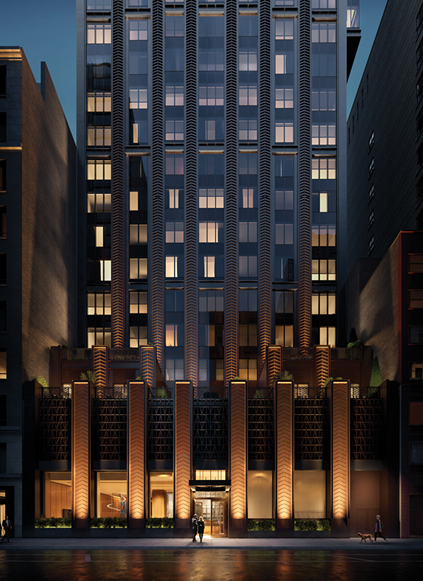- Home
- Media Kit
- Current Issue
- Past Issues
- Ad Specs-Submission
- Ad Print Settings
- Reprints (PDF)
- Photo Specifications (PDF)
- Contact Us
![]()
ONLINE
![]()
ONLINE

Committed
to New York
Editors’ Note
Meg Brod is the Senior Vice President and Regional Development Officer, Northeast Region, for Rockefeller Group. In this role, she is responsible for overseeing the company’s current office, residential, and mixed-use developments in the region including the Rose Hill condominium project in NoMad, 200 East 83rd Street (an Upper East Side condominium development project), Flushing Commons mixed use development as well as entitlement work on a large scale mixed use development in Hoboken, New Jersey. Brod is a highly experienced real estate developer and investor and has held real estate development and investment positions at Bedrock Real Estate Partners, Equity Residential, Tishman Speyer and Pritzker Residential. She is a member of the REBNY board of directors and an active member of WX New York Women Executives in Real Estate. She has received numerous recognition and awards including Bisnow’s “New York Power Women” and Crain’s Notable Women in Commercial Real Estate. Brod holds a bachelor’s degree from Duke University and an MBA from Harvard Business School.
Company Brief
Rockefeller Group (rockefellergroup.com) is one of the most trusted names in real estate – a leading developer, owner and operator, known for pioneering large-scale urban mixed-use development. For 90 years the company has been trusted for its financial strength, stability and vision, and today remains committed to the selective development of innovative, high-quality properties that create long-term economic and civic value.

Entrance of Rose Hill in NoMad
Will you discuss your role and key areas of focus at Rockefeller Group?
We are organized by region and my focus is on the Northeast. I am the regional development officer for the Northeast and my primary focus is on New York and the Tri-State Area.
How has the global pandemic impacted Rockefeller Group’s business?
We are fortunate that in the Northeast many of our commercial spaces were fully leased to high credit tenants which has allowed us to weather the storm better than if we had been sitting with an empty building or with tenants who were struggling. We did see challenges with some of our retail tenants and have worked with them to address their needs.
Rockefeller Group takes a long-term view and is committed to New York and we believe in the future of New York. We know that it will take time and that things may get worse before they get better but, ultimately, we are confident that New York will come back as it has done many times in the past.
At the beginning of the pandemic last March, we went to a temporary remote workforce except for the essential workers in our buildings such as building security and property management staff, and we did experience some construction delays on projects that were forced to close due to government orders. We continued to push ahead wherever possible in order to keep things operating. We didn’t change our corporate goals and focused on being creative and innovative in order to reach our goals despite the challenges of COVID.

A Rose Hill flex room
Will you discuss the Rose Hill project and what do you feel the impact will be from this development?
Rose Hill is our first condominium project located in NoMad and it was designed to address living in the future. The units allow for flexibility of floor plans so people can comfortably live and work in the space as they have been forced to do today because of the pandemic. For example, 50 percent of our units have flex space where you can close the door to a room but still have light and a window so it can be used very flexibly, whether you are having a baby and need a nursery, or working from home, or want a TV/entertainment space – whatever suits your needs depending on the stage of life you are in. In the luxury market where sales have slowed, we have been able to keep prices stable as they were already smartly priced due to the flexibility provided in the usage of the space. The units at Rose Hill are well-positioned for today and for the future, which is what distinguishes our units from the competition.
Rose Hill also includes a strong amenity offering. We have wellness driven amenities, including a great bike room that is intentionally located so you can easily take your bike in and out of the building. We have teamed up with a number of New York-based partners for our wellness offerings. We are working with FHITTING ROOM to offer fitness classes and we have a professional-grade squash court in collaboration with SquashRx, as well as an expansive 50-foot pool surrounded by hand-crafted, green oxide-glazed tiled walls. The library off the lobby offers books curated by the Strand Bookstore, which is another example of how we are working with local brands to bring a wellness and lifestyle component to the building.

Fitness center at Rose Hill curated by FHITTING ROOM
How critical has it been for Rockefeller Group to invest in its older buildings in New York in order to effectively compete with the new development in the market?
Our building at 1271 Avenue of the Americas is a great case study of how to address this issue. I believe that what has created such value for Rockefeller Group is the location of our buildings and assets which won’t change, but the buildings can be transformed. 1271 was a massive redevelopment project which looks like a new building in a location that cannot be replicated. We took the strength of the location and transformed the building into what works today, whether it is upgrading the lobby or upgrading all of the systems or transforming the exterior. We have been very competitive in upgrading our existing buildings to compete against the new development in the market. At the end of the day, real estate is about location, location, location which is a differentiator for Rockefeller Group and a key to our success.
How concerned are you about the future of retail and what are the keys to creating a successful retail offering?
I am concerned about the future of retail. My opinion is that it will need to adapt to something that is seen as an amenity to the building based on the location. Retail needs to be seen as a partnership among the owners of the property and the retail tenants in order to be successful. If the tenants are successful, the landlords will be successful, and working together is key to making retail work in the future. There may be cases where landlords need to realize that the traditional lease structure should be abandoned in order to create a building amenity to further attract tenants and to add value to the building. At 1271, we were able to sign the restaurant Avra during the pandemic shutdown. We believe that Avra will attract people to the building and it is a good example of an effective partnership between the tenant and the landlord.

A lving room at Rose HIll
As a leading woman executive in the real estate industry, do you feel that there are strong opportunities for women to grow and lead in the industry?
It has been slower than we would like to see, but there has been progress made. I acknowledge that there are not enough women in the industry in general and there are not enough women in leadership roles in the industry, but I do believe it is slowly changing. Leading companies and senior management are implementing initiatives around diversity in the workforce which is making a difference and it is important for women to mentor each other. I know firsthand about the benefits of having women mentors which has been a great value to me during my career in the industry. I hope to be able to do the same for the women coming into the industry.
What excited you about the opportunity to join Rockefeller Group and has it been what you expected?
It has been what I expected and more. At the time when I was interviewing for this position about four years ago, there was a change in leadership happening at Rockefeller Group and the idea of being a part of writing the next chapter of Rockefeller Group was very exciting for me. I was excited to participate in the transformational growth of the company and it is rewarding to be a part of Rockefeller Group’s evolution.
New York faces many challenges and there is debate about the future of New York. What is your outlook for New York and are you optimistic about its recovery?
I don’t understand how people question New York’s future. There is an excitement that you get when you are in New York and people who love New York will always love New York. There will always be so much talent in New York and talent attracts talent. People want to be where things are happening, and I have no concerns over the strength and resiliency of New York which has been shown time and time again. I believe that New York will not only return, but will return stronger and better.![]()